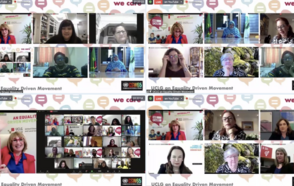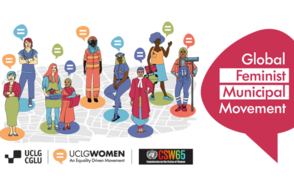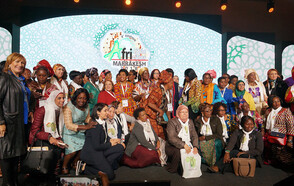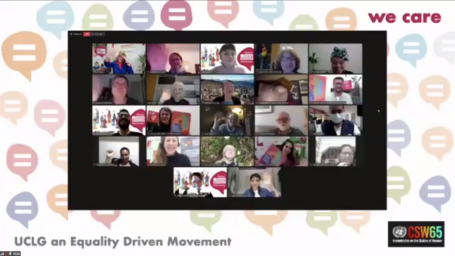
In the framework of the 65th session of the Committee on the Status of Women (CSW65), UCLG fostered a gathering on the importance of the participation of women and feminist leaders in politics and decision-making as a key factor to enable governing with empathy, to prioritizing the public in direct response to the needs and aspirations of the people and communities.
Structured around an opening session led by UCLG leadership, the event addressed what putting care at the centre of policymaking would entail in terms of concrete policies, and what the feminist municipal movement considers as key priority areas to recover from the pandemic.
Mayor of Polokwane and UCLG Co-President Thembisile Nkadimeng opened the session highlighting how UCLG has always championed gender equality and called to recognise the contribution of women at the forefront by putting gender equality at the heart of policymaking through policies of r
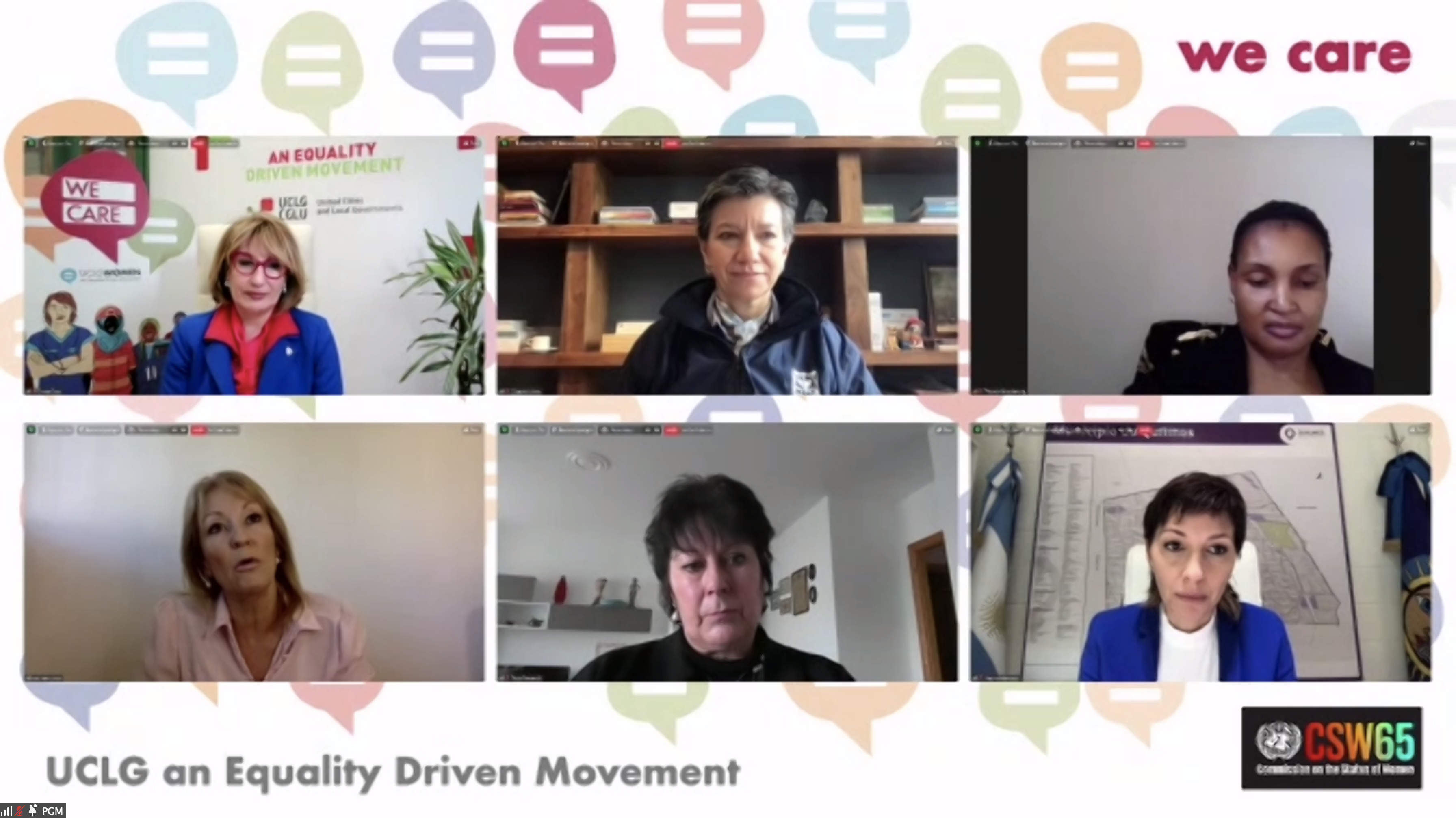
edistribution of wealth and transformation of public spaces. Her opening remarks also addressed UCLG joining the call to convene the Fifth World Conference on Women, and how the municipal movement urges the international community to come together to defend women’s rights.
“Towards the recovery and in the pandemic aftermath, women must occupy their rightful place. For that reason, we have launched a call to action, of “Women’s Leadership for the Post COVID-19 Era”. Our leading role is crucial to driving us to inclusive and resilient cities, to cities that care about its people, without leaving anyone behind” Thembisile Nkadimeng, UCLG Co-President.
The opening session also had Mayor of Bogotá, Claudia López, and Mayor of Montevideo, Carolina Cosse, framing the ensuing conversation. They argued that putting care at the center in the recovery calls for generating jobs that consider the situation of women all over the world, and to understand care work as something that needs to be undertaken by men and women alike. Care work, the mayors highlighted, does not only mean protecting each other, but that it involves resilience and preparing for a future that is increasingly more complex. Rosa Pavanelli, Secretary General of PSI, also addressed the need to recognize the value of public health workers and how it is critical to involve in partnerships that recognize women in the frontline and develop egalitarian work.
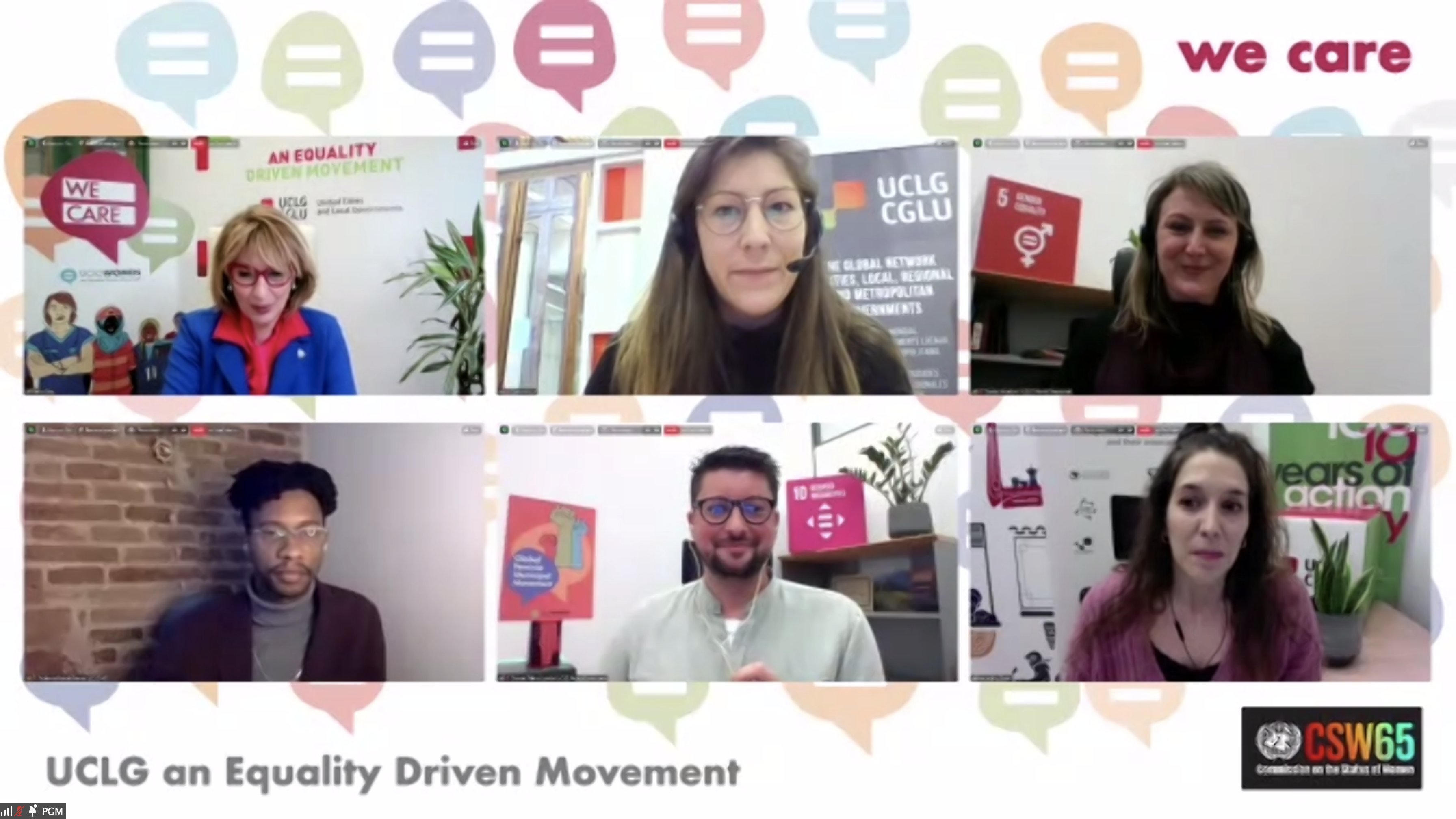
Activists from the municipal movement Alejandra Salas; Steven Patrick Landry; Carole Morillon; Sarah Vieux; and Federico Batista Poitier delivered the key messages from the “Voices from Municipalist Movement - Statement to CSW65 and Call to Action” calling to include women, girls, and diverse groups including LGBTQI persons, older persons and persons with disabilities in decision-making, and to understand the defense of women and girls’ rights as the defense of local democracy and human rights. Finally, the call argued that safeguarding women’s rights needs to fall on the shoulders of the entire society, involving men and boys in the defense of gender equality.
The first roundtable, Local government caring for people (16h40 – 17h30) was facilitated by Lucy Slack, Deputy Secretary-General, CLGF and introduced local perspectives and experiences during the pandemic, and recommendations on how to integrate policies that care. Mayra Mendonza, Mayor of Quilmes, and Noraini Roslan, Mayor of Subang Jaya both highlighted the importance of addressing mental health in the recovery, especially since lockdowns had affected men and women in an unequal manner. The value of public space and ensuring women and men have equal access to it in the recovery will be critical, they argued, to overcome gender inequality. 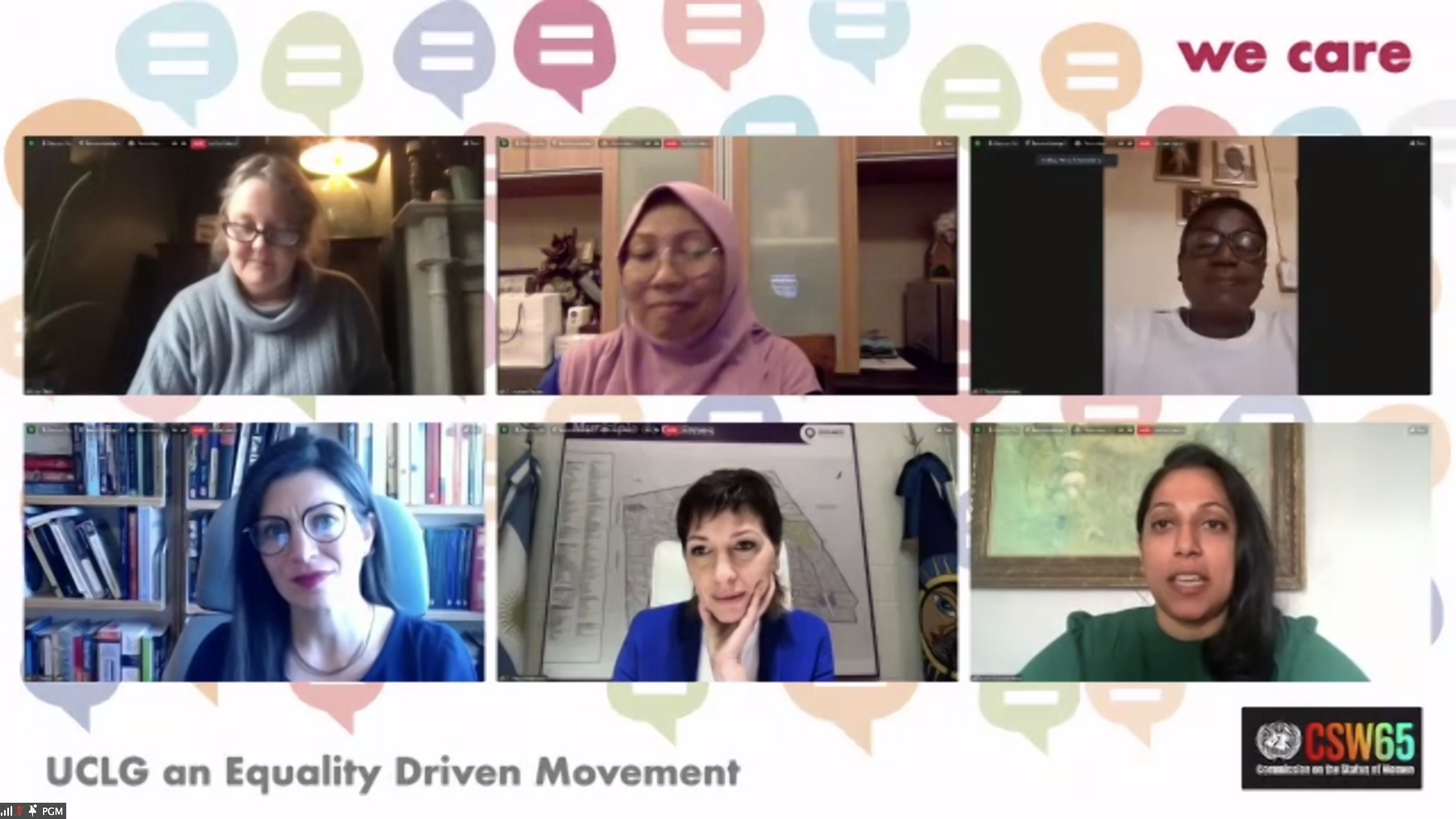
Carole Saab, CEO, Federation of Canadian Municipalities argued for the importance of local and regional governments’ associations to empower local governments to scale-up their work and be able to finance feminist policies. Penny Abeywardena, New York City's Commissioner for International Affairs further addressed the importance of developing structural policies to tackle inequality, especially regarding vaccine delivery and ensuring equal access to basic services by vulnerable populations.
Rose Molokoane, Slum Dwellers International, called on local authorities to consider grassroots women and ensure that the data collected on women in informality was used after the pandemic.
The final panel, Transforming service provision for inclusive communities was facilitated by Emilia Saiz, Secretary General of United Cities and Local Governments addressed how to engage women in decision-making as a means to develop policies that would lead to inclusiveness and gender equality.
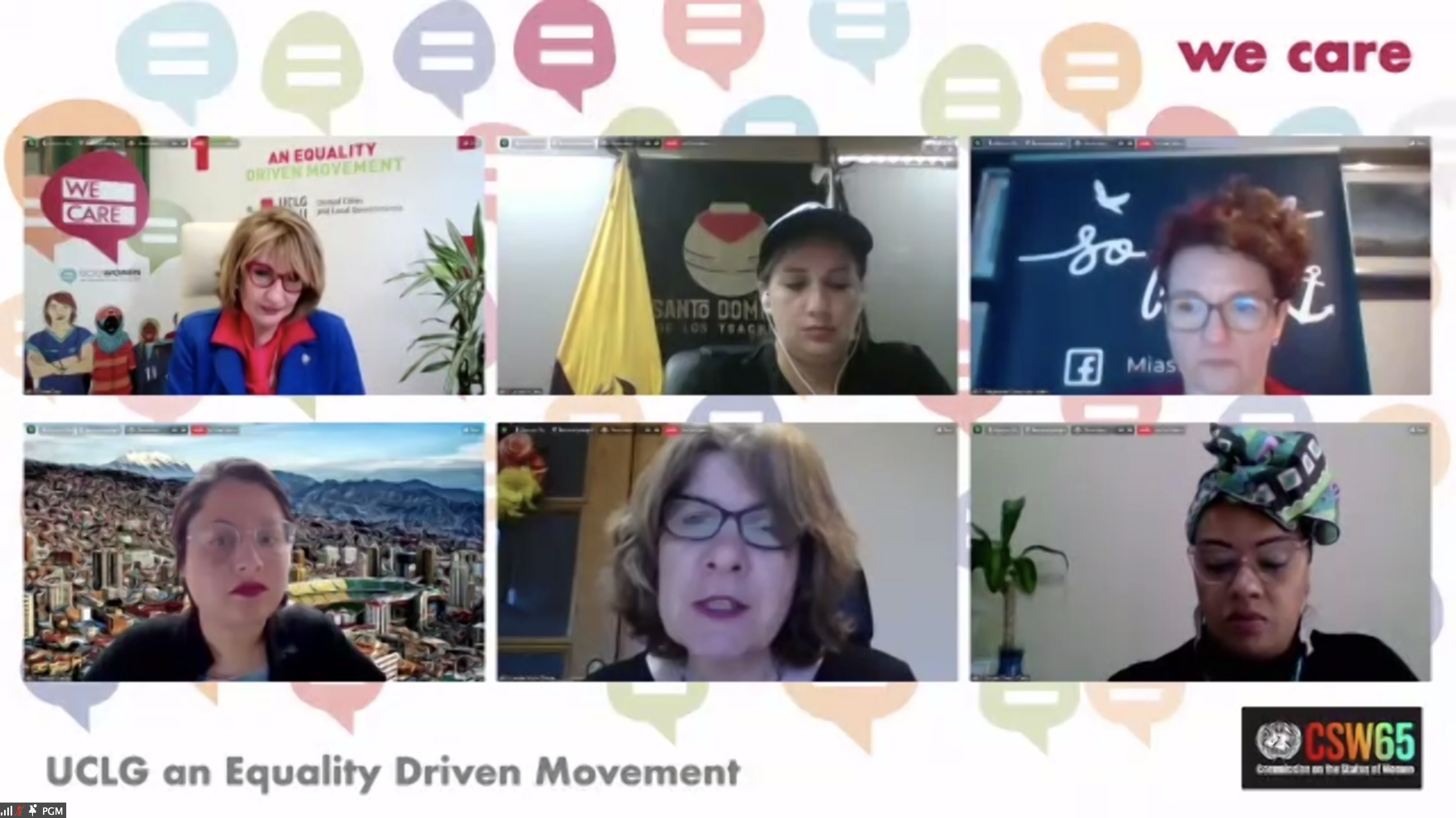 Gabriela Cuevas, Co-Chair of the Universal Health Coverage 2030 (UHC2030) Steering Committee and mayor of Esplugues de Llobregat and delegate for International Affairs for the Barcelona Provincial Council Pilar Díaz highlighted the value of frontline women, and argued that in spite of women being frontliners, this was not reflected in decision-making processes. Ensuring equal access in decision-making is essential to recover better for both men and women, and the current numbers show we are not on track.
Gabriela Cuevas, Co-Chair of the Universal Health Coverage 2030 (UHC2030) Steering Committee and mayor of Esplugues de Llobregat and delegate for International Affairs for the Barcelona Provincial Council Pilar Díaz highlighted the value of frontline women, and argued that in spite of women being frontliners, this was not reflected in decision-making processes. Ensuring equal access in decision-making is essential to recover better for both men and women, and the current numbers show we are not on track.
Alison Evison, Councillor in Aberdeenshire and President of COSLA, also highlighted the struggle of local women in Scotland, and called on local governments’ associations to empower local elected women and encourage diversity in local elections. Andrea Cornejo Vargas, President of the Municipal Council of La Paz, echoed these words and argued that it is critical to involve activists in the decision-making and empower women with disabilities to be involved in policies to truly design inclusive cities and territories.
Gissela Chalá, Vice Mayor of Quito argued that placing care at the center calls for strengthening the role of the state in caring for communities. The public sphere, she argued, can be critical in transforming the lives of women and all citizens. Johana Nuñez, Prefect of Santo Domingo de los Tsáchilas, addressed the obstacles she had overcome in order to be a region’s leader, and the importance of leading by example and carrying out feminist policies as a local and regional leader. Magdalena Czarzyńska-Jachim, Deputy Mayor of Sopot, also highlighted the importance of women leaders to build gender equality, and to overcome authoritarian tendencies and respond to backlashes to gender equality by placing care at the centre.
At the end of the session, it was reminded that the inputs from women mayors and local leaders from all over the world will be a part of the recommendations for the Pact for the Future that UCLG has been mandated to develop, which will inform the work plan of UCLG for the coming years.











